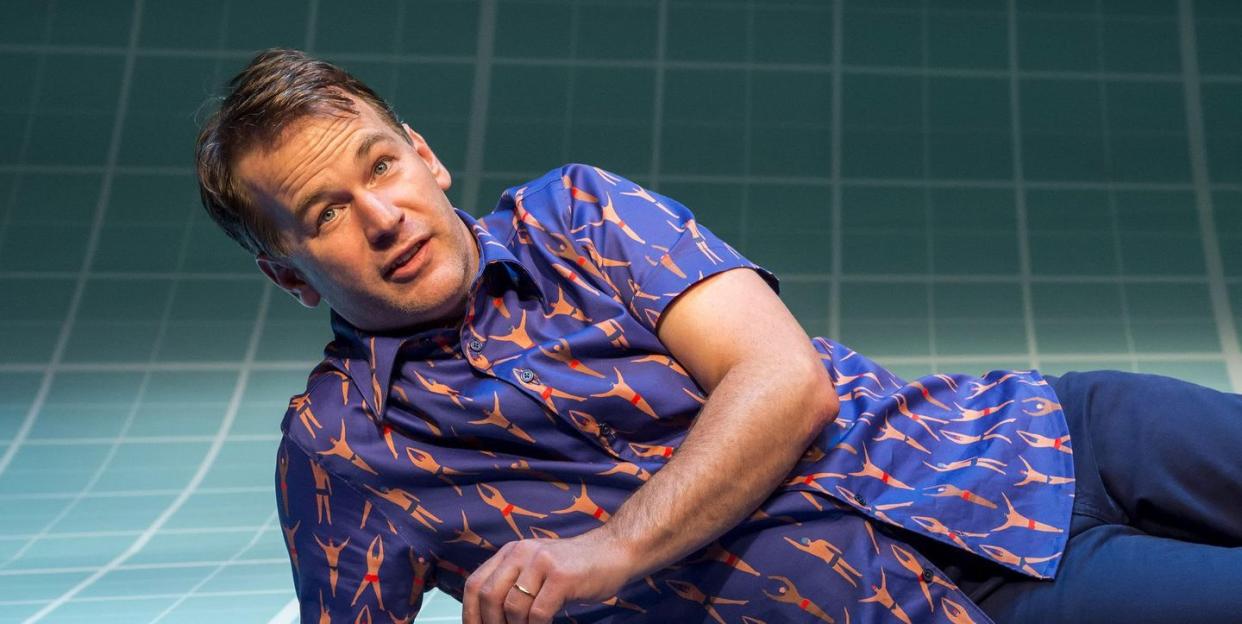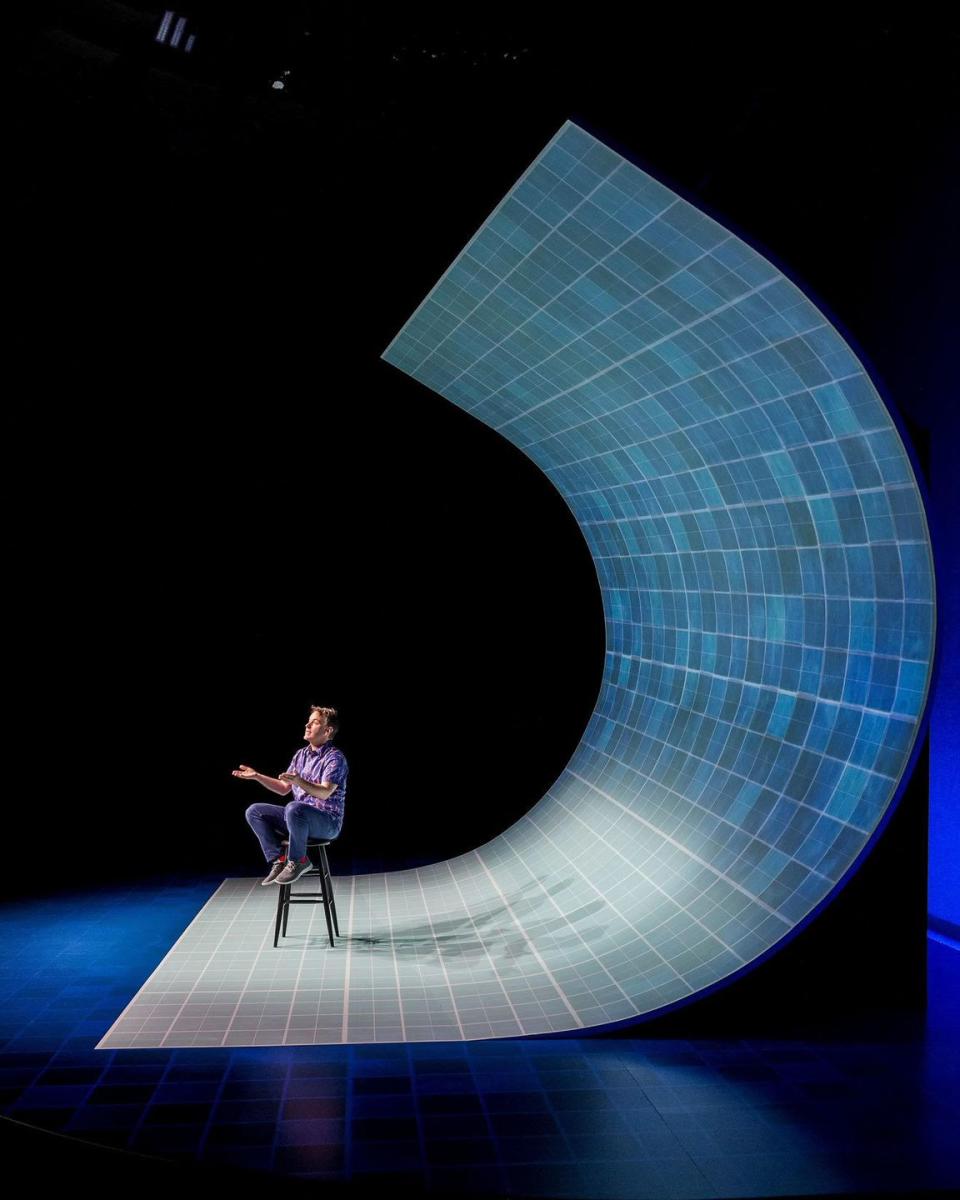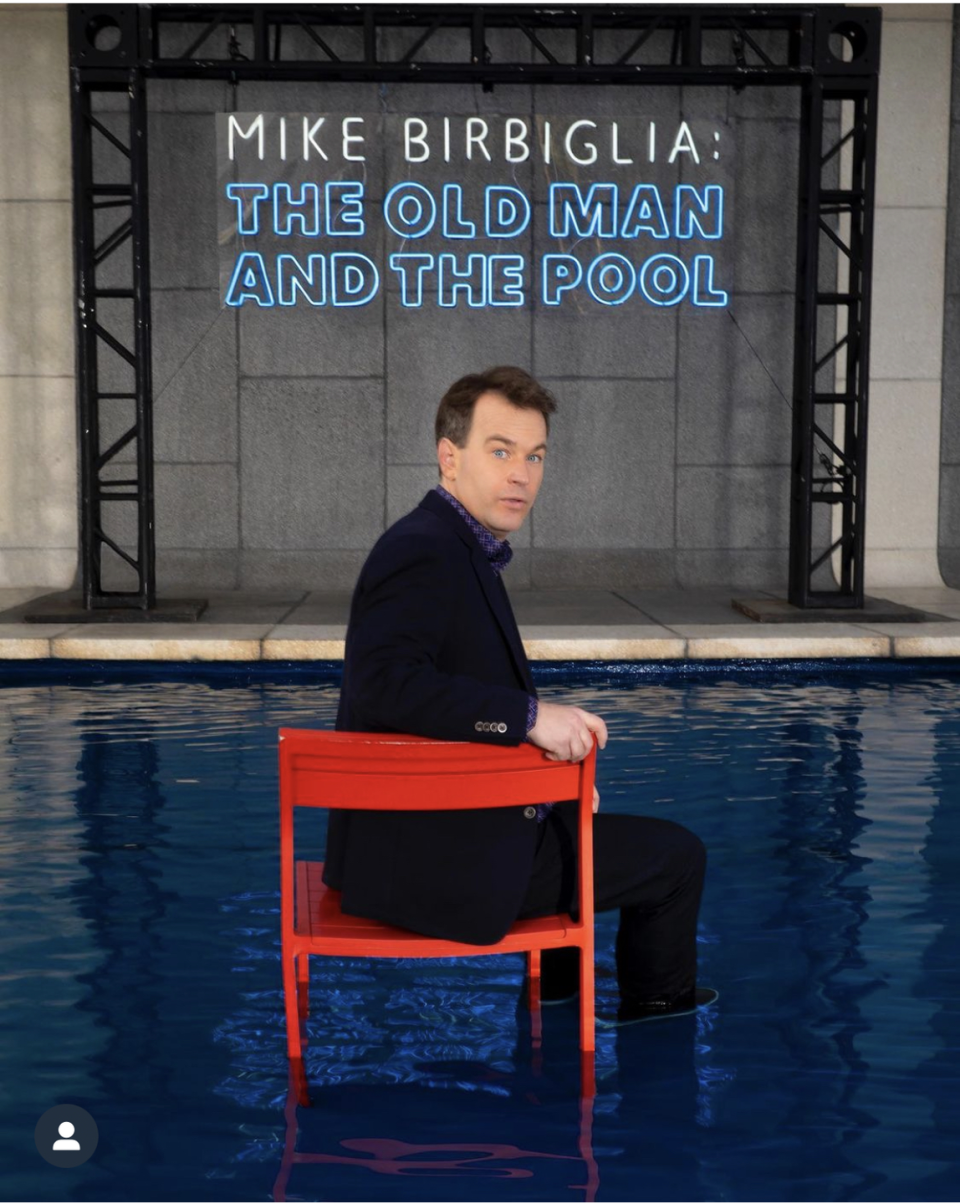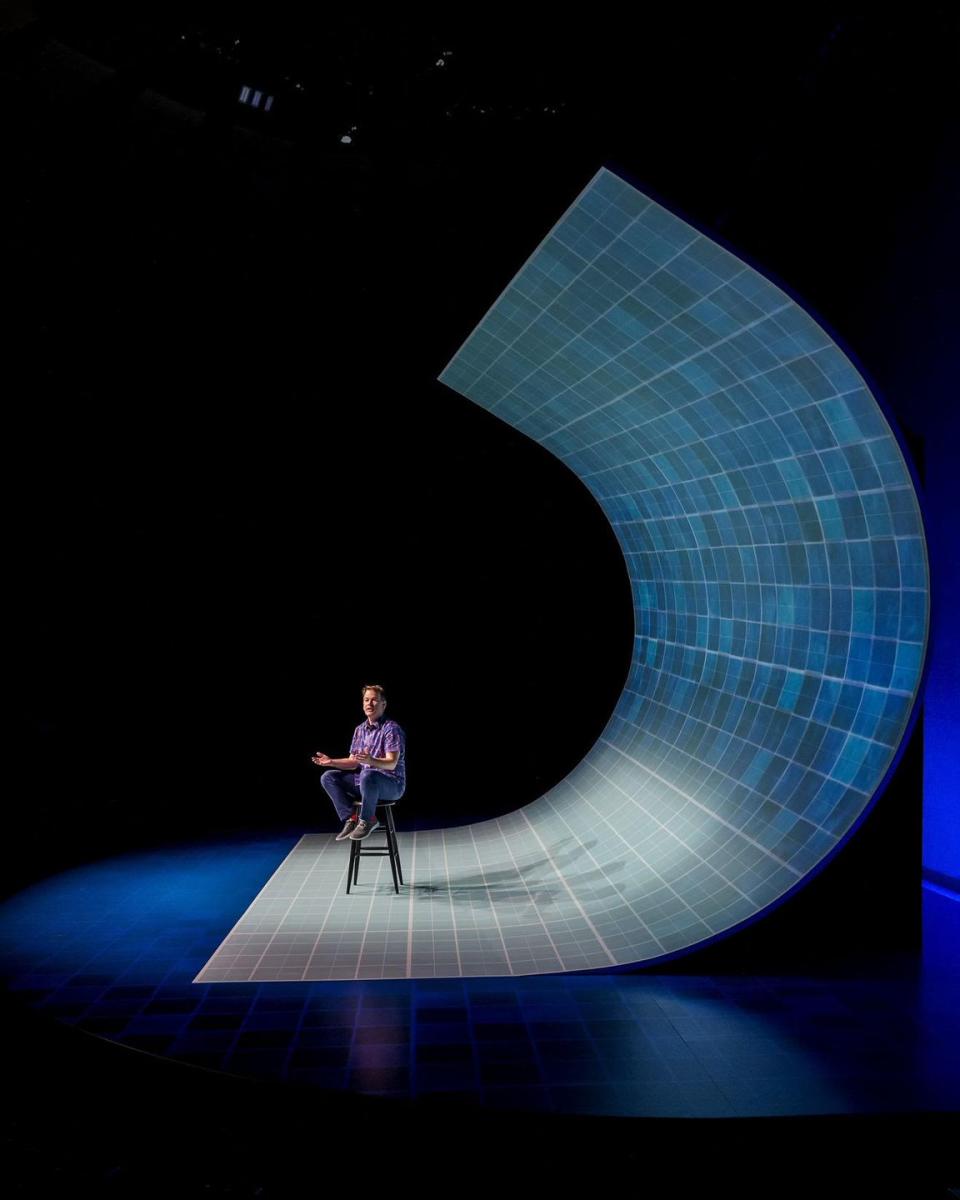Mike Birbiglia Swore He'd Never Do This

- Oops!Something went wrong.Please try again later.
Mike Birbiglia wants to apologize. The AirBnB he is staying in while he is in Los Angeles for a run of performances of his new show, The Old Man and the Pool, has been making a mysterious chirping sound. "The comedy bits are not written," he jokes, a sly reference to the irritating, everyday moments that often fuel his observational humor. "I just record my life and then edit it down." He seems a little wired and unable to relax. I assure him multiple times I cannot hear the noise and that also, I get it. If I’d fallen "down an AirBnB rabbit hole for seven hours" like Birbiglia did during his lodging hunt, I’d want the place I chose to be free of irksome squeaks too. This brings me to an important question: "Why didn’t you just stay in a hotel?" Birbiglia nods his head in the direction of the kitchen. "It’s a health thing," he says, settling into his chair. "Not unrelated to the themes of the show, actually."
The Old Man and the Pool picks up where Birbiglia’s 2018 Netflix special, The New One, leaves off. Having finally adjusted to fatherhood, Birbiglia is coasting toward middle age when a routine physical exam sends him reeling. Turns out the former third-string hockey player from Massachusetts isn’t in great shape. In fact, he’s got Type II Diabetes, and now his older brother, Joe, is telling him he needs to write a will. "How in the hell did I get here?" Birbiglia asks aloud during one of The Old Man and the Pool’s several tender moments. The answer is as obvious as it is pie-shaped: pizza. Determined to reverse the diagnosis, Birbiglia started eating healthier and exercising. "It looks like the swimming is paying off," I tell him. It’s quite the transformation for the multi-hyphenate comedian who once joked that his favorite food is ice cream sandwiches, followed closely by the paper they are wrapped in.
Hasan Minahj has known Mike Birbiglia since 2013 when they met at the Just for Laughs festival, and Birbiglia offered to let the young stand-up open for him at an upcoming performance in Davis, California (Minahj’s hometown). He says Birbiglia is one of the sweetest people he’s ever met and calls him a "story magician" and a "Tarantino-style, comedic storyteller" on account of the way Birbiglia jumps back and forth through time in his shows.
With The Old Man and the Pool, Birbiglia’s most immersive and theatrical performance yet, Minahj thinks his pal is expanding the boundaries of stand-up comedy. "Like most great artists, he’s stretching the genre and doing new, innovative things within it," he says, before adding, "To see where [Mike] is now, I really think he's one of the great auteur comedians."
The Old Man and the Pool will head to Broadway in October after stops in Pittsburgh and Nashville. Below, Birbiglia dishes to Esquire about the tour, life with less pizza, and why Maria Bamford and Richard Pryor are the G.O.A.T.s of stand-up. This conversation has been edited for clarity and length.
Esquire: How's it going? How are you feeling about the show?
Mike Birbiglia: It’s good. It's interesting. When you take a comedy monologue that you've been working on for four years and then marry it with a set designed by Beowulf Boritt, a costume designed by Toni-Leslie James, projections by Hana Kim, and lighting by Aaron Copp, it becomes something that is outside of myself. I go from essentially being the monologue to being a part of the play, and I'm living inside the play.

As a writer, it's great, because when you live inside the play you start to understand new things about the show. You go, "Oh, I guess I don't need to say this line. It actually isn't essential for the story.”
What’s happened so far that’s made you realize that?
Well, for example, there's a scene where I talk about coming back from my doctor's appointment and being on the subway. But the way that the lighting and the costumes come together, it paints the picture of being on a subway so that I don’t have to say that’s where I am. That’s when the show becomes a play.
That reminds me of the moment from your last special, The New One, when you are talking about not wanting to have kids because of how much stuff they require, and all the sudden hundred of toys drop from the ceiling behind you.
It's such an interestingly polarizing experience, that show. Long after it came out on Netflix, I discovered a child-free Reddit thread. They were very adamant that they loved the first half of the show where I made an argument against having children. But they felt like I betrayed them when I had a child, and it's so funny because they're literally describing the structure of the show. That’s what drama is. You're not intended to agree with the person telling you the story or the characters in the story.
I think that sometimes culturally, particularly recently, people have become drawn to comedians whose point of view they see one-for-one. They're like, "That's exactly how I feel. That's the person who I'm going to follow." I've never been interested in that. I'm actually more interested in people who have a different point of view. I've always loved Doug Stanhope, but I don't have anything in common with him.
I feel like you also get a lot of energy from conflict or from a charged back-and-forth with someone. A lot of your material has been about difficult conversations or miscommunications.
I think that's accurate. In The New One, I said something to the effect of, "I was very clear about never wanting children." I'm obsessed with the idea of being very clear with your language because there were so many moments when I was younger and people weren't clear, and, as a result, I’d be in a situation asking myself, "How did I end up here?" I've learned to over-communicate in my life.

Speaking of over-communicating … You used to be adamantly and openly against marriage. Then you were quite vocal about not wanting children. In your new show, you talk about how when you were little, you swore you’d never step foot in a YMCA again. Now you’re a married man with a kid who goes to the YMCA five days a week. Do you ever look at your life and think, "Maybe I shouldn’t make so many hard and fast rules?"
It’s so funny. I think your observation is astute. I've had that realization about film recently too. After directing two feature films, I've learned to appreciate more things about film than I previously did. I studied plays and films in college, and I was way more of a snob then than I am now. I felt like independent films were good and studio films were bad. I'll tell you a funny anecdote about this: I never saw Meet the Parents when it was in theaters because I thought it was a big studio comedy, and I was too good for that.
At the time, I was opening for Mitch Hedberg, who I thought was the coolest comedian on earth. We were in Dayton, Ohio and drove by the cineplex, and Hedberg asked me if I’d seen Meet the Parents. I said, "No, I don't really watch movies like that; I like more independent films." And he goes, "Oh man, that's one of the funniest movies I've ever seen. I think you'd think it's pretty funny." So I went and saw it, and he was right. I've had a few of those moments over the years, where I start to realize that, as an artist, snobbery isn’t your friend.
All of your shows draw from personal experiences. How do you decide on your material? Are you sitting there in the moment thinking, "This is a surreal experience. I should turn this into a show.”
I really don’t, but I journal every few nights. What I find is that after six months or something, I’ll go through my entries, and three of them—out of a hundred— could be in a show. I write so much garbage, it's astonishing.
What do you think sets The Old Man and the Pool apart from your other non-fiction works?
My friend, Alex Edelman, came to a workshop of the show last summer and said, "It's different from your other shows because you're hunting big game now. It’s about life and death." I think that encapsulates the challenge and the fun of it. I enjoy when people go to dark places in their comedy and find some hint of optimism. I think it allows the audience to experience true catharsis.
Why do you like that hint of optimism? Not every comedian likes to give the audience that relief; I’m thinking of George Carlin in his later years.
It’s just a personal taste. Life will serve you a lot of darkness. I think the best artists and entertainers task themselves with giving people a respite from the darkness. My favorite kinds of movies are ones like Broadcast News where you have three people who are in love with each other, but none of them end up together. They all go in their own directions. I always cry at the end of Broadcast News, but not because it's the outcome I wanted. It’s not the outcome I wanted, and that's beautiful also.

You sound like an optimist. I don't mean to simplify it. I think there's a lot of nuance there. I'm just trying to place you along the comedian sadness spectrum. It sounds like, for you, there's a really, really, really long tunnel, but then at the very end of it, a teeny little light.
I think that’s accurate. Did you ever see Richard Pryor's Live on the Sunset Strip?
Yes, of course.
He has that story about freebasing with cocaine and then lighting himself on fire. That’s pretty much as dark as it gets. But then he describes being at the hospital and having his bandages removed. What he's doing is giving us the gift of sharing it in detail and taking something so sad and making it funny.
Are some things too dark to joke about?
No, I don't think so. I heard someone say once, "If life is this dark, then comedy should be allowed to be this dark too." Because you're trying to acknowledge the reality and then match it with something comedic that is just as powerful.
I like that quote. Are you an anxious person?
Yeah.
What does your anxiety look like?
Let me put it this way: Before the pandemic, I was writing a movie about a global pandemic.
Do you think that you are raising your child better than you were raised?
There's literally no way to know. I feel like whether you're raising a child or not, we're always making mistakes all the time, and we never know what they are until later. I have a general theory, which is, "Nothing is anything until later." It's like my journal entries. You can't know what it is until you zoom out and go, "Oh, okay, that's when I felt that way."
Why are so many comedians from Boston?
My only guess is some combination of weather and Catholicism.
You grew up Catholic, right?
Yeah, I was full on. One of my first jokes was: I was an altar boy as a kid and the answer is, "No." It leads to a lot of guilt, and a lot of guilt leads to a lot of introspection and shame, and introspection and shame make for good jokes.
Simple as that.
And seasons. Seasons, I think, are key. There are a lot of great artists from Minnesota too. Maria Bamford, Bob Dylan, Mitch Hedberg, Prince.The list is endless for Minnesota.
Maria Bamford is one of my all-time favorites.
Maria Bamford is the perfect example of exactly the kind of comedy I like, which is to say, she's expressing something that feels like a secret and that you'd be reluctant to mention at a dinner party. But in the context that she's framing it in, it allows all of us to experience this catharsis at the same time. And the fact that she can do all the voices and she can flip in and out of them. She's essentially creating these little one-act plays in real time, and it's amazing.
I like that you have such a wide taste in comedy. It's making me think about what we were talking about earlier, the idea that something has to be relatable in order for you to enjoy it. Are you worried that you're going to be judged like that, as opposed to on the merits of your show?
I don't know if this answers the question, but I think that there's something happening right now in comedy that's a very positive outcome after years and years of this very narrow scope of voices—just tons of white men—in comedy. Now you have Zarna Garg, whom I had on my podcast recently, and Atsuko Okatsuka, who has been touring with me. Both incredible.
I think it's an exciting time for comedy because people are opening their minds to the fact that the more perspectives we have in comedy, the better off we are. But then there's the counter movement, which is bro comedy, and that’s a huge thing. I actually like some of that too. Generally, I think it's a good moment in comedy. There's a lot of potential for where things could go.
Do you think your work serves a higher purpose?
I think that as a comedian or an artist you can decide to give yourself to the audience, or you can decide to look really cool and have people admire you. The artists that I tend to enjoy are the ones who give themselves to the audience. They don’t have to do that. If you're good enough at the skill, you can trick the audience into thinking you're giving yourself to them. A lot of really skilled comedians do that.
What brings me joy is when people message me and say something like "After I saw the show with my mom, she went to the doctor for this scan that she was overdue on," or, "I ended up in a conversation with my 12-year-old son who came with me to the show about heaven." Someone posted that the other day and that was really meaningful to me. Any outcome that has to do with someone taking action is a good outcome.
You Might Also Like

